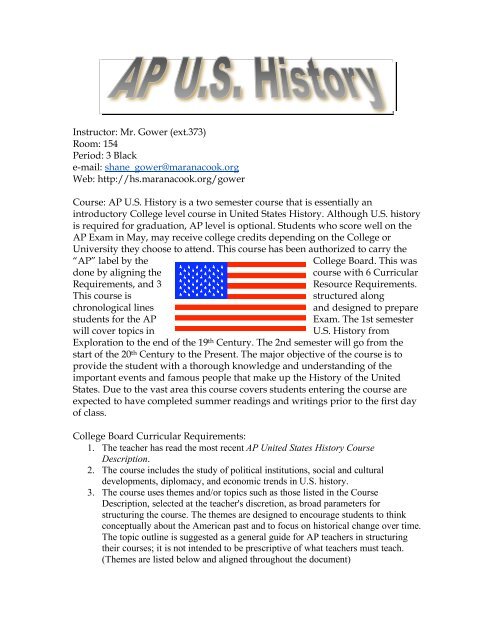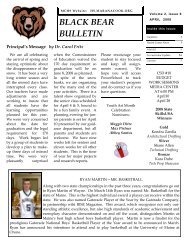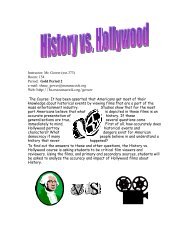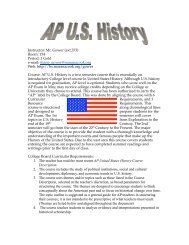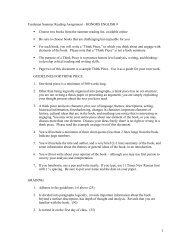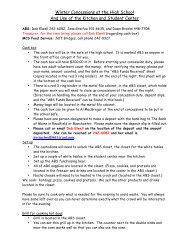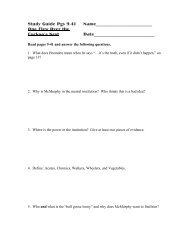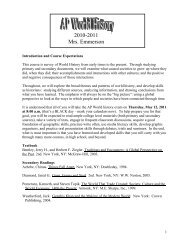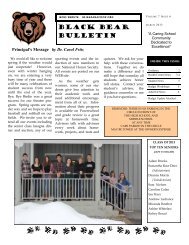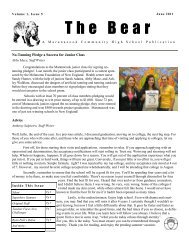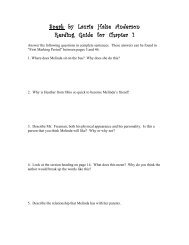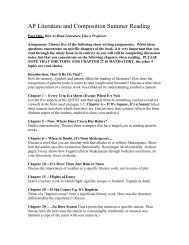AP US History Syllabus 10-11 - Maranacook Community High School
AP US History Syllabus 10-11 - Maranacook Community High School
AP US History Syllabus 10-11 - Maranacook Community High School
You also want an ePaper? Increase the reach of your titles
YUMPU automatically turns print PDFs into web optimized ePapers that Google loves.
Instructor: Mr. Gower (ext.373)<br />
Room: 154<br />
Period: 3 Black<br />
e-mail: shane_gower@maranacook.org<br />
Web: http://hs.maranacook.org/gower<br />
Course: <strong>AP</strong> U.S. <strong>History</strong> is a two semester course that is essentially an<br />
introductory College level course in United States <strong>History</strong>. Although U.S. history<br />
is required for graduation, <strong>AP</strong> level is optional. Students who score well on the<br />
<strong>AP</strong> Exam in May, may receive college credits depending on the College or<br />
University they choose to attend. This course has been authorized to carry the<br />
“<strong>AP</strong>” label by the College Board. This was<br />
done by aligning the course with 6 Curricular<br />
Requirements, and 3 Resource Requirements.<br />
This course is structured along<br />
chronological lines and designed to prepare<br />
students for the <strong>AP</strong> Exam. The 1st semester<br />
will cover topics in U.S. <strong>History</strong> from<br />
Exploration to the end of the 19 th Century. The 2nd semester will go from the<br />
start of the 20 th Century to the Present. The major objective of the course is to<br />
provide the student with a thorough knowledge and understanding of the<br />
important events and famous people that make up the <strong>History</strong> of the United<br />
States. Due to the vast area this course covers students entering the course are<br />
expected to have completed summer readings and writings prior to the first day<br />
of class.<br />
College Board Curricular Requirements:<br />
1. The teacher has read the most recent <strong>AP</strong> United States <strong>History</strong> Course<br />
Description.<br />
2. The course includes the study of political institutions, social and cultural<br />
developments, diplomacy, and economic trends in U.S. history.<br />
3. The course uses themes and/or topics such as those listed in the Course<br />
Description, selected at the teacher's discretion, as broad parameters for<br />
structuring the course. The themes are designed to encourage students to think<br />
conceptually about the American past and to focus on historical change over time.<br />
The topic outline is suggested as a general guide for <strong>AP</strong> teachers in structuring<br />
their courses; it is not intended to be prescriptive of what teachers must teach.<br />
(Themes are listed below and aligned throughout the document)
4. The course teaches students to analyze evidence and interpretations presented in<br />
historical scholarship.<br />
5. The course includes extensive instruction in analysis and interpretation of a wide<br />
variety of primary sources, such as documentary material, maps, statistical tables,<br />
works of art, and pictorial and graphic materials.<br />
6. The course provides students with frequent practice in writing analytical and<br />
interpretive essays such as document-based questions (DBQ) and thematic essays<br />
(see the Course Description for more information).<br />
College Board Resource Requirements:<br />
1. The school ensures that each student has a college-level U.S. history textbook<br />
(supplemented when necessary to meet the curricular requirements) for individual<br />
use inside and outside of the classroom.<br />
2. The school ensures that each student has copies of primary sources and other<br />
instructional materials used in the course for individual use inside and outside of<br />
the classroom.<br />
3. The school ensures that each student has access to support materials for the <strong>AP</strong><br />
U.S. <strong>History</strong> course, including scholarly, college-level works that correspond with<br />
course topics; writings by major American authors; as well as standard reference<br />
works such as encyclopedias, atlases, collections of historical documents, and<br />
statistical compendiums, either in a school or public library or via the Internet.<br />
NOTE: On this syllabus, CR1= This is evidence to meet Curricular Requirement 1, RR1=<br />
This is evidence to meet Resource Requirement 1, etc.<br />
Resources: (RR1)<br />
Text<br />
Carnes, Mark C., and Garraty, John A.. The American Nation. <strong>10</strong>th. New York:<br />
Longman, 1999. (RR1)<br />
Newman, John, and Schmalbach, John. United States <strong>History</strong>: Preparing for the<br />
Advanced Placement Examination . 3rd. New York: AMSCO <strong>School</strong><br />
Publications, 2004. (Note: you may purchase your own to keep for $15) (RR1)<br />
Supplements (RR2, RR3)<br />
22 Years of DBQ’s. The College Board. 1998.<br />
American <strong>History</strong> Online. 2006. Facts on File. 30 Nov 2006<br />
.<br />
Bellamy, Edward. Looking Backward, 2000-1887. New York:<br />
Bedford/St.Martin's, 1995.<br />
Crum, Jonathan. ARCO <strong>AP</strong> U.S. <strong>History</strong>. Lawrenceville, NJ: Petersons, 2001.<br />
Ellis, Joseph J.. Founding Brothers. New York: Random House, 2002.<br />
Freidan, Betty. The Feminine Mystique. New York: W W Norton & Co Inc, 1984.<br />
Hofstadter, Richard. The American Political Tradition and the Men Who Made It.
New York: Random House, 1989.<br />
Irons, Peter. A People's <strong>History</strong> of the Supreme Court. New York: Penguin<br />
Books, 1999.<br />
Kelton, Elmer. The Wolf and the Buffalo. New York: Bantam Dell Publishing<br />
Group, 1997.<br />
Madaras, Larry, and Sorelle, James. Taking Sides: Clashing Views on<br />
Controversial Issues in American <strong>History</strong> The Colonial Period to<br />
Reconstruction. 8th. Columbus, OH: McGraw-Hill, 2001.<br />
Madaras, Larry, and Sorelle, James. Taking Sides: Clashing Views on<br />
Controversial Issues in American <strong>History</strong> Reconstruction to the Present. 9th.<br />
Columbus, OH: McGraw-Hill, 2002.<br />
McCarthy, Timothy Patrick, and McMillian, John. The Radical Reader: A<br />
Documentary <strong>History</strong> of the American Radical Tradition. New York: W W<br />
Norton & Co Inc, 2003.<br />
The Nystrom Desk Atlas. Washington, DC: Varsitybooks.Com, 1995.<br />
Williams, William Appleman. The Tragedy of American Diplomacy. New York:<br />
W W Norton & Co Inc, 1988.<br />
Woodward, Bob. Shadow: Five Presidents and the Legacy of Watergate. New<br />
York: Simon and Schuster, 2000.<br />
Zinn, Howard. A People's <strong>History</strong> of the United States :1492-Present. New York:<br />
HarperCollins, 2005.<br />
Various Readings, videos, and Transparencies.<br />
<strong>AP</strong> U.S. <strong>History</strong> Themes (CR3)<br />
1. American Diversity<br />
2. American Identity<br />
3. Culture<br />
4. Demographic Changes<br />
5. Economic Transformations<br />
6. Environment<br />
7. Globalization<br />
8. Politics and Citizenship<br />
9. Reform<br />
<strong>10</strong>. Religion<br />
<strong>11</strong>. Slavery and its legacies in North America<br />
12. War and Diplomacy<br />
NOTE: On this <strong>Syllabus</strong>, T1= evidence of American Diversity (Theme 1), etc.<br />
Course Outline (CR1)<br />
Big Picture Essential Question: What are the foundations<br />
of Amercan Democratic Ideals?
Day One: I. Test over Summer Readings (From the following: Zinn, Howard. A<br />
People's <strong>History</strong> of the United States :1492-Present. New York: HarperCollins,<br />
2005. (Chapter 1: Columbus, the Indians, and Human Progress) ; Carnes, Mark C.,<br />
and Garraty, John A.. The American Nation. <strong>10</strong>th. New York: Longman, 1999. ;<br />
Madaras, Larry, and Sorelle, James. (pages 3-86) Taking Sides: Clashing Views on<br />
Controversial Issues in American <strong>History</strong> The Colonial Period to Reconstruction.<br />
8th. Columbus, OH: McGraw-Hill, 2001. (Issue four: Did Capitalist Values<br />
Motivate the American Colonists?))<br />
Day Two: II. Introduction to the Course and Pre-Revolution America review<br />
Essential Question: How did the colonies make the idea work of<br />
coming together in a union and yet keep their separate identities?<br />
(T2, T3, T5)<br />
3 weeks<br />
Newman Book: 42-96<br />
Garraty Book: <strong>10</strong>9-124, 138-153,<br />
Ellis Book: Chapters 1-4 (CR4)<br />
Desk atlas<br />
Topics:<br />
III. The Struggle for Independence (CR2)<br />
A. French and Indian War<br />
B. Declaration of Independence 1776<br />
IV. The Articles of Confederation<br />
V. Framing the New Constitution<br />
VI. The Federalist Era, Founding Brothers<br />
Major Assignments/Assessments:<br />
John Marshall Court Essay (CR6)<br />
Book Review- Summer book (CR5)<br />
DBQ Introduction: Wethersfield, CT Democracy (CR5)
Test 9/30<br />
Students are introduced in these lessons to the concepts of categorizing<br />
documents, recognizing bias in documents, and gathering historical evidence<br />
from documents.<br />
Essential Question: What defines American Democracy? (T3, T8,<br />
T9)<br />
4 weeks<br />
Newman Book: 121-221<br />
Garraty Book: 169-179, 203-222, 249-270<br />
Hofstadter Book: Chapter 2 Thomas Jefferson, Chapter 3 Andrew Jackson (CR4)<br />
Irons Book: Chapter 9 Marbury v. Madison<br />
Desk Atlas<br />
VII. The Jeffersonian Period (CR2)<br />
A. Political Parties<br />
VIII. The War of 1812<br />
IX. The Era of Good and Bad Feelings<br />
A. Monroe Doctrine<br />
X. Economic Growth<br />
XI. Jacksonian Era<br />
A. Economy- National Bank (Cr2)<br />
Major Assignments/Assessments:<br />
Hamilton vs. Jefferson Debates(CR5)<br />
Dollar Bill Presentation (CR5)<br />
French and Indian War DBQ- Grading other students essays(CR6)<br />
Test <strong>11</strong>/4<br />
Big Picture Essential Question: How were American<br />
Democratic Ideals spread to more areas of society?<br />
Essential Question: How and why did the Civil War happen? (T1,<br />
T3, T4, T7, T<strong>10</strong>)<br />
7 weeks<br />
Newman Book: 221-380<br />
Garraty Book: 281-294, 341-374, 403-431<br />
Taking Sides: Issue 12 Was the Mexican War an Exercise in American<br />
Imperialism? (CR4)<br />
Desk Atlas<br />
Zinn Book: Chapter 9 Slavery without Submission, Emancipation without<br />
Freedom (CR4)
Hofstadter Book: Chapter 5 Abraham Lincoln (CR4)<br />
Irons Book: Chapter 13 and 14 Dred Scott Case<br />
XII. The Antebellum Reform Movement (CR2)<br />
XIII. Manifest Destiny<br />
A. Mexican War<br />
XIV. Slavery and Southern Economy<br />
A. Sectional Problems 1848-1861<br />
XV. The Civil War<br />
How did the Civil War happen?<br />
XVI. The Reconstruction of the South (CR2)<br />
XVII. The Closing of the Western Frontier<br />
A. Turner Thesis<br />
Major Assignments/Assessments:<br />
Jacksonian Democracy DBQ Activity (CR6)<br />
Dred Scott Simulation (CR5)<br />
Mexican War Debates (CR5)<br />
Test 12/ 20<br />
Semester Final= Mid-Term Exam- Over the first Semester 1/18<br />
Big Picture Essential Question: How were American<br />
Democratic Ideals spread to other parts of the world??<br />
2nd Semester<br />
Essential Question: How did America become a world power? (T5,<br />
T6, T7, T<strong>11</strong>, T12)<br />
4 weeks<br />
Newman Book: 400-447<br />
Garraty Book: 467-495, 529-552, 599-626, 631-647, 657-672<br />
Kelton Book: 278-372
McCarthy Book: Land and Labor 243-273<br />
Zinn Book: Chapter 13 The Socialist Challenge (CR4)<br />
Irons Book: Chapter 21 Free Speech cases<br />
XVIII. Industrial Capitalism (CR2)<br />
XIX. The Response of Labor<br />
XX. The Agrarian Response<br />
XXI. American Imperialism<br />
A. Spanish-American War<br />
XXII. Progressive Movement (CR2)<br />
XXIII. America and the Great War<br />
Major Assignments/Assessments:<br />
Wizard of OZ and Populism Multiple Intelligences activity (CR5)<br />
Teddy Roosevelt simulation/murder investigation (CR5)<br />
DBQ : Imperialism (written at home) (CR6)<br />
Test 3/3<br />
Essential Question: How and why did American Foreign policy<br />
change from isolationism to internationalism? (T2, T4, T7, T12)<br />
3 weeks<br />
Newman Book: 470-570<br />
Garraty Book: 689-714, 737-746, 779-800, 814-830<br />
Bellamy Book (CR4)<br />
McCarthy Book: Anarchism, Socialism, and Communism 277-326 (CR4)<br />
Williams Book (CR4)<br />
Irons Book: Chapter 30 Brown v. Board of Education<br />
XXIV. The Roaring 20’s<br />
XXV. Great Depression and the New Deal (CR2)<br />
A. Stock Market Crash<br />
XXVI. Foreign Affairs 1921-1939 (CR2)<br />
XXVII. America and World War Two
XXVIII. The Cold War (CR2)<br />
A. Korea<br />
Major Assignments/Assessments:<br />
Hoover vs. FDR DBQ in class (CR6)<br />
Isolationism simulation (Choices) (CR5)<br />
Make your Own DBQ- Field trip to Margaret Chase Smith Library and Museum (CR5)<br />
Test 4/7<br />
Big Picture Essential Question: How did the tension<br />
around American Democratic Ideals versus American<br />
Democratic Reality result in modern U.S. Society?<br />
Essential Question: How and why did the American public become<br />
increasingly dissatisfied with its government? (T1, T3, T4, T5, T8,<br />
T<strong>11</strong>)<br />
4 weeks<br />
Newman Book: 570-619<br />
Garraty Book: 833-850, 887-895<br />
McCarthy Book: The New Left and Counterculture 461-5<strong>11</strong> (CR4)<br />
Zinn Book: Chapter 18 The Impossible Victory: Vietnam (CR4)<br />
Desk Atlas<br />
Taking Sides: Issue 14 Was America’s Escalation in Vietnam inevitable? (CR4)<br />
Freidan Book (CR4)<br />
Woodward Book: Ford and Carter<br />
Irons Book: Chapter 33 Roe v. Wade<br />
XXIX. America in the 1960’s<br />
A. Civil Rights<br />
End of 3rd Quarter
XXX. Vietnam (CR2)<br />
XXXI. America in the 1970’s<br />
A. Watergate<br />
Major Assignments/Assessments:<br />
Eisenhower and Cold War DBQ activity(CR6)<br />
Civil Rights for all? Simulation (CR5)<br />
Essential Question: What defines “Modern America”? (T2, T3, T4,<br />
T7)<br />
2 weeks<br />
Newman Book: 619-677<br />
XXXII. Modern America (1980-Present)<br />
A. Brief <strong>High</strong>light Overview<br />
XXXIII. Review for Exam<br />
<strong>AP</strong> Exam Time: May 6, 20<strong>11</strong><br />
(Review for the Exam begins after school on April 28)<br />
4 weeks<br />
XXXIII. Middle <strong>School</strong> Lessons (CR5)<br />
Semester Final Project (During Finals Week) “Civil Rights For All?”<br />
Note: You are encouraged to take the <strong>AP</strong> Exam, however sometimes a student decides not<br />
to take the Exam. In this case a regular test will be given in class over only the material<br />
covered since the last test. This test will be given on May <strong>10</strong> and only be available for<br />
those not taking the <strong>AP</strong> test.<br />
Project and Test Calendar:<br />
The following is a calendar for major projects and tests throughout the year, these dates<br />
are subject to change. Remember that there may be other smaller projects during the year.<br />
Summer Test: 9/2<br />
Book Review:<br />
9/13<br />
Test 2: 9/30<br />
Take Home DBQ:<br />
<strong>10</strong>/6
Currency Project:<br />
<strong>10</strong>/29<br />
Test 3: <strong>11</strong>/4<br />
In-class DBQ:<br />
<strong>11</strong>/22<br />
Test 4: 12/20<br />
Semester Final Mid Term Exam:<br />
1/18<br />
Who Murdered Theodore Roosevelt?:<br />
1/27<br />
In-class DBQ:<br />
2/3<br />
Test 6: 3/3<br />
In-class DBQ:<br />
3/21<br />
Create Your Own DBQ:<br />
4/4<br />
Test 7: 4/7<br />
<strong>AP</strong> Exam or Test 8: 5/6<br />
Lessons for Middle <strong>School</strong>:<br />
5/26<br />
Semester Final:<br />
“Civil Rights for All?” Finals Week (Hopefully 6/6-6/<strong>10</strong>, but we’ll probably use some<br />
snow days and so it would be 6/13-6/17)<br />
Expectations:<br />
Please Note: Since this is a College level Course, students are expected to behave<br />
appropriately at all times !!<br />
• Students are expected to arrive to class on time and prepared (Notebook, and<br />
pen or pencil ready).<br />
• Students are expected to create and support a positive learning environment<br />
for all students.<br />
• Make up work is due upon return to school, this is your responsibility !! Also
you must schedule times to make up test and quizzes. Homework is posted<br />
on the board on on my Homework board for the week. Remember, most<br />
college professors don’t accept late work, get in the habit of doing it on time.<br />
• Students are expected to be ready to contribute orally on a regular basis.<br />
• Students will treat everyone in the class (including me) with respect at all<br />
times.<br />
• Students should have and maintain a 3-ring binder to keep handouts and for<br />
note-taking.<br />
• Students should show an interest in U.S. <strong>History</strong> and learning in general.<br />
(Remember this course is a demanding elective, but its not required for<br />
graduation !)<br />
• Please see me if and when you need extra help, don’t wait until its too late !<br />
I’m available most days after school, and anytime by appointment.<br />
Five Basic Classroom Rules:<br />
1. Be Respectful<br />
No leaning back in chairs, unless you want to pay to have them repaired<br />
No writing on desks, unless you’d like to pay to have them cleaned<br />
No putting feet up on desks, unless you would like to sterilize your desk<br />
at the end of the period.<br />
Only water is allowed during class, NO OTHER BEVERAGES!! Abuse of<br />
this privilege will result in no drinks during class!<br />
Food may only be consumed during the first few minutes of the period, or<br />
only on special occasions authorized by me! Abuse of this privilege will<br />
result in no food during class!<br />
Take care of all trash and your things left behind. Keep your desk area<br />
clean!!<br />
2. Be Responsible<br />
Once you “choose” a seat, stick to it! (Seats will be assigned based on<br />
where you are sitting on 9/8)<br />
You must arrive within 1 minute of the late bell, or you will be marked<br />
tardy. 3 tardy’s results in a detention with me.<br />
I recommend you don’t bring backpacks or book bags to class! Use you<br />
lockers and put a lock on them!!!!!<br />
Leaving the room during class is NOT a right, but a privilege. I only allow<br />
one person out of the room at a time unless you have a pass, and<br />
sometimes I don’t allow anyone out unless it is an absolute emergency.<br />
Treat others in the room with respect at all times!!<br />
3. Hands & Feet To Self<br />
Respect the space of others.
Be appropriate in displays of affection<br />
4. Follow Directions<br />
Whenever you leave the room, you must sign out with the time. Sign in<br />
with the time when you return. If you were gone more than 5 minutes and<br />
don’t have a pass, you make up the time with me that you missed either<br />
before or after school. (Hint, if your bathroom emergency takes longer<br />
than 5 minutes, get a pass from the Health Center!!!!) Repeat offenders<br />
will receive an ISB and detention regardless.<br />
3 bathroom breaks per quarter are allowed. If you need to go more then 3<br />
times per quarter, you will make up the time you are out of class with me<br />
either before or after school. Failure to comply results in an ISB and<br />
detention. Use the 5 minutes between classes wisely!!!!!!!! Repeat offenders<br />
will receive an ISB and detention regardless.<br />
Pay attention and listen carefully.<br />
5. Be There- Be Ready<br />
Come to class with a Notebook, a pen, & a pencil everyday!!<br />
Come to class with the Homework done neatly.<br />
Participate in class discussion & activities.<br />
Don’t bring uneccessary things that are likely to distract you! If it ends up<br />
distracting you, I will confiscate it for the rest of the class.<br />
Evaluation:<br />
Students will be graded on each assignments out of <strong>10</strong>0%. Grade values are:<br />
A+ 97-<strong>10</strong>0<br />
A 93-96<br />
A- 90-92<br />
B+ 87-89<br />
B 83-86<br />
B- 80-82<br />
C+ 77-79
C 73-76<br />
C- 70-72<br />
D+ 67-69<br />
D 65-66<br />
N/C 0-64<br />
Each Semester student assessment will break down roughly along these<br />
percentages:<br />
Tests (3 each semester) 20%<br />
Special Tests (1 each semester, summer test and <strong>AP</strong> Exam) 6%<br />
Quizzes (varies) 12%<br />
DBQ’s, etc. (2 first semester and book review, 3 2nd semester) 15%<br />
Special Assignments (varies: current events, essays, TR sim) <strong>10</strong>%<br />
Homework & Class participation (varies) 5%<br />
Projects (1 each semester, currency and middle school lessons) 14%<br />
Journals (8 each semester) 4%<br />
Semester Final (1 st Semester) and Final Project (2 nd Semester) 15%<br />
Special note: Since this is a College level course, some students may find the level and<br />
amount of work difficult to handle. There will be a lot of work !! Please see me as soon as<br />
you run into problems.<br />
This course addresses the following Maine State Learning Results Standards for<br />
Social Studies: (Note: These are the revised Standards as of May 2006)<br />
A. Applications Of Social Studies Processes, Knowledge, And Skills - Students will apply<br />
critical thinking, the research process, and discipline-based processes and knowledge from<br />
civic/government, economics, geography, and history in authentic contexts.<br />
1. Students develop research questions and modify them as necessary to direct investigations<br />
of current Social Studies Issues, and locate, select, synthesize, present and defend<br />
information from multiple and varied sources.<br />
2. Students make collaborative decisions and take action on matters related to social studies<br />
using relevant information, and research, collaboration, and Ethical Reasoning Skills.<br />
B. Civics And Government - Students will draw on concepts and processes from civics<br />
and government to understand political systems, power, authority, and governance, civic<br />
ideals and practices, and the role of citizens in the community, state, nation, and world.<br />
1. Students understand the ideals, purposes, principles, structures, and processes of<br />
constitutional government in the United States and the American political system, as well as<br />
examples of other forms of government and political systems in the world.
2. Students understand the constitutional and legal rights, the civic duties and<br />
responsibilities, and roles of citizens in a democratic republic and the role of citizens living<br />
under other forms of government in the world.<br />
3. Students understand political and civic aspects of unity and diversity and the political<br />
systems of cultures in Maine, the United States, other nations, and in International<br />
Relations.<br />
E. <strong>History</strong> - Students will draw on concepts and processes from history to develop<br />
historical perspective and understand issues of continuity and change in the community,<br />
state, nation, and world.<br />
1. Students understand Major Eras and Major Enduring Themes in United States and world<br />
history, the roots of democratic philosophy, ideals, and institutions in world history, and<br />
major historical influences on the present and future.<br />
2. Students understand the Historic influence and significance of the concepts unity and<br />
diversity on the development of the United States and peoples of the world


